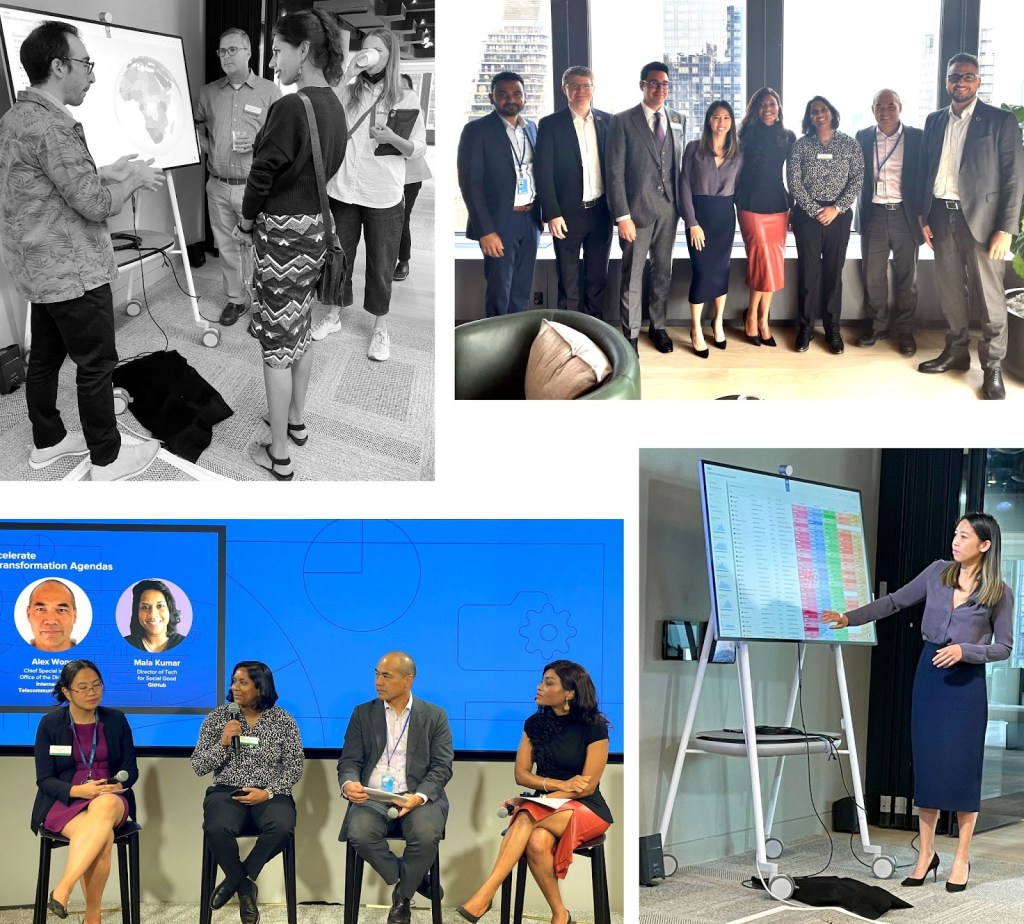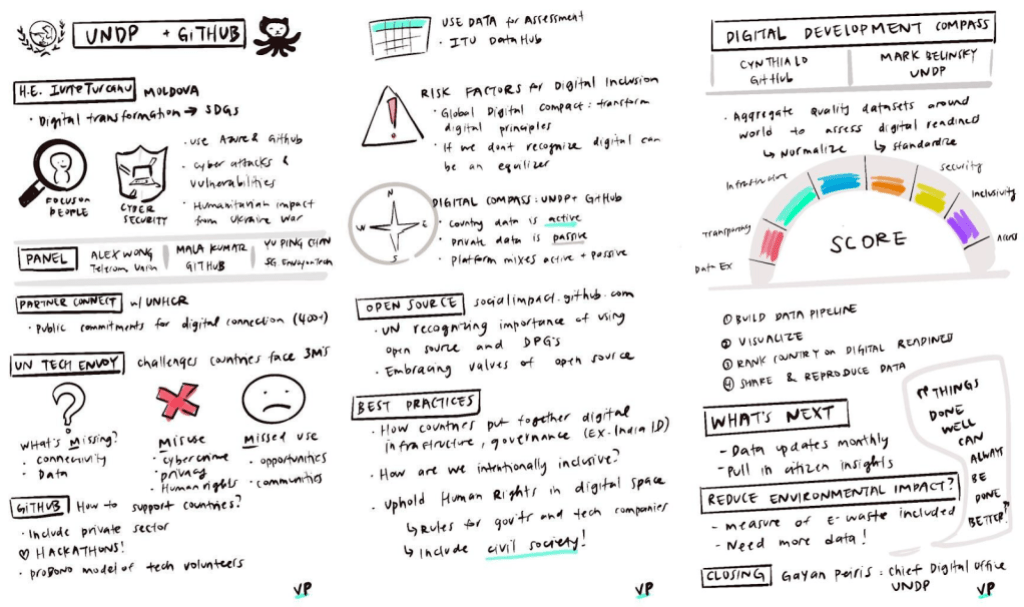The United Nations General Assembly (UNGA) is one of the main bodies of the UN system. Its 77th session kicked off on Tuesday, September 13, 2022, with the theme, of “A watershed moment: transformative solutions to interlocking challenges.” This was the first in-person session of UNGA since the start of the COVID-19 pandemic. GitHub works with and supports several UN specialized agencies and the UN Secretariat. With the support of Microsoft, GitHub was pleased to host and participate in three UNGA 77 side-events.
GitHub Social Impact UNGA side‐events
Open Source Programme Offices in the UN System: a spotlight on WHO
Watch the recording
GitHub’s Social Impact, Tech for Social Good team cohosted two UNGA77 side-events. The first covered the Open Source Programme Office (OSPO) at the World Health Organization, which launched earlier this year and was highly anticipated throughout the UN system.
GitHub staff, Mala Kumar (Director, Tech for Social Good) and Bassem Dghaidi (Senior Solution Architect), joined panelists Ayman Badr, Dušan Milovanovīc, and Samual Mbuthia from WHO, and Yu Ping Chan from the UN Envoy on Technology. Samuel recently joined WHO as the new OSPO lead and this side‐event was his first public appearance in the role.

During the event, WHO spoke about its long history with open source software. This is the first time an OSPO had been created in the UN system, and its importance was a common theme throughout the session. As Ayman Badr, the Digital Programme Manager, Health Emergencies at WHO explained:
“We hope to demonstrate that this [OSPO] is a needed resource to other UN agencies.”
Bassem and Dušan focused their discussion on the technical aspects leading up the OSPO creation, such as the need to build strong innersource processes within WHO. Samuel and Ayman spoke about the vision and priorities of the WHO OSPO. On the topic of how the culture change of an OSPO in the UN can contribute to more equitable technology and inclusive economic growth, Yu Ping noted:
“An OSPO within the UN system actually makes for a much more practical approach to technology. This will be really important in creating the culture shifts of the UN…and bring it to the communities we serve.”
Mala echoed this idea, pointing out that UN specialized agencies are able to hire citizens of more countries in more countries than most private sector technology companies. OSPOs in the UN system can therefore create new open source software employment opportunities for citizens of low- and middle-income countries.

The panel discussion was met with great enthusiasm. Audience members spoke about open source efforts in other parts of the UN, as well as the importance of engaging UN monitoring and evaluation practitioners, as they are likely to already be using open source solutions.
Watch the recording
The second event focused on an innovative new tool from the UN Development Programme (UNDP) called the Digital Development Compass that GitHub’s Skills-Based Volunteering Program built. The tool aggregates publicly available data on countries’ digital development in one platform to support digital transformation.

GitHub staff, Cynthia Lo (Program Manager, Skills-Based Volunteering), Matt Rothenberg (Staff Researcher), and Amelia Wattenberger (Staff Research Engineer), presented on the interface and functionality of the tool. Mala Kumar spoke on the panel, alongside panelist, Yu Ping Chan from the UN Envoy on Technology, and Alex Wong from the UN International Telecommunication Union (ITU). The event keynote speech was by Deputy Prime Minister, Digitalization for the Republic of Moldova, Iurie Țurcanu. His Excellency, Iurie Țurcanu, highlighted that:
“Today, digitalization is on the agenda of every country. Each of us wants our citizens to benefit fully from the advantages of modern technologies.”
The keynote panelist was Robert Opp, Chief Development Officer at UNDP, who raised important points on how national progress on digital transformation can now be done easier and faster than ever. UNDP staff also spoke about the tool’s use cases and delivered the closing remarks. Tolu Olubumni, Founder and Chief Executive Officer of Lion’s Write, hosted the event and moderated the panel.
Audience members from tech, international development, and policy were particularly interested in the data sources used and the potential use cases. One audience member raised a good question that UNDP and GitHub hope to address:
“Does this inclusive digital transformation and digital compass also include the environmental damage?”
We would also like to give a special thanks to Vivian Peng, Lead Data Scientist at the Rockefeller Foundation, for creating these detailed notes of the event!

Other GitHub UNGA77 appearances
Mike Linksvayer, Head of Policy at GitHub, was a panelist in the Tech for Democracy – Problems, Progress and the Copenhagen Pledge high-level side-event. The event was cohosted by the Danish Ministry of Foreign Affairs and Access Now.

During the second event panel, Mike spoke about why GitHub signed the Copenhagen Pledge on Tech for Democracy and the importance of engaging with the global developer community to build secure software that improves service delivery in order to improve the robustness and legitimacy of civil society and democratic institutions. Microsoft President and Vice Chair, Brad Smith, delivered the event’s opening speech. The Danish Minister for Foreign Affairs, Jeppe Kofod, and Shirley Ayorkor Botchwey, Ghanian Minister for Foreign Affairs and Regional Integration, delivered remarks preceding each panel. Danish Tech Ambassador, Anne Marie Engtoft Larsen, moderated the event. The event closed with a screening of a new AI art exhibit that illustrated global sentiment around technology and democracy.
Thank you!
GitHub would like to thank the Microsoft UNIO office for their support and for providing the venue to host our events. We’d also like to thank the many panelists and planners who came together. This was the first UNGA in which GitHub hosted side-events and we hope to see you again next year!
